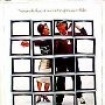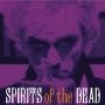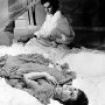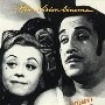Sceicco bianco, Lo
| 片名: | Sceicco bianco, Lo |
|---|---|
| 其它片名: | 白酋长/The White Sheik |
| 导演: | Federico Fellini |
| 编剧: | Federico Fellini, Tullio Pinelli, Ennio Flaiano |
| 制片人: | Luigi Rovere |
| 摄影: | Arturo Gallea, Leonida Barboni |
| 剪辑: | Rolando Benedetti |
| 主演: | Alberto Sordi, Brunella Bovo, Leopoldo Trieste |
| 音乐: | Nino Rota |
| 片长: | 86分钟 |
| 年份: | 1952年 |
| 类型: | 剧情 |
| 国别: | 意大利 |
| 语言: | 意大利语 |
| 格式: |
影片概述 . . . . . .
Having seen most of Federico Fellini's movies, any viewer who not only watches the films but experiences the cinema may draw the conclusion that the director changed his style over the years. In other words, he turned to be more "skeptical" more "knowledgeable" and more "dreamlike." To realize that, we have to consider his earliest films - his honeymoon period - for clearer understanding of the change. The movie that resembles Fellini's freshness most is LO SCEICCO BIANCO. Here, it is hardly the Fellini we know from JULIET OF THE SPIRITS or CITY OF WOMEN. It is a fresh, genuine, young Fellini where some viewers even fail to recognize the director. Nevertheless, if one watches the film more deeply, it is possible to notice something characteristic of Fellini. To make it more clear, let me briefly look at the content first.
A young couple from the provincial part of Italy, Ivan Cavalli (Leopoldo Trieste) and Wanda Giardino Cavalli (Brunella Bovo), come to Rome for their honeymoon. Here, mind you that honeymoon symbolizes not only the mutual freshness, appreciation but also the lack of boredom resulting from routine of life. The honeymoon also appears to be the sort of "illusive prelude" to the everyday. Ivan is very strict, honorable and plans the visit exactly to the very letter with the schedule list which contains introducing of his wife to his noble family, sightseeing of Rome and the climax of the stay: the audience at the pope's. Wanda, however, is more "light hearted", enthusiastically absorbed in arts of 24th May Street and aims rather at adventure than at the formal side of the visit. When they enter the Tre Fiori Hotel, she soon disappears fleeing into the world of her dreams, illusions and fantasies. Will she find the stay at her illusive world of a white sheik (Lo Sceicco Bianco) more comfortable and convincing?
While analyzing the content (not revealing more of it), I think that this is one of the movies where Fellini is mostly HIMSELF. He touches similar themes like in his later movies, including social criticism, formality in relations, dominance, destructive illusions, social discrepancies, and disillusion. Yet, he remains absolutely clear. Criticizing social conventions, he aims at addressing the problem: what should the marital status be like? While discussing dominance, he seems to draw our attention to the different personalities of the couple. Most importantly, however, Fellini develops the destructive effect of illusions, which he would do in many of his later films, paying attention to Wanda's fanatic idolatry and fantasies: "real life is a dream." When she enters the 24th May Street and, more strictly, when she meets the white sheik, isn't that Cabiria entering the house of Alberto Lazzari in Fellini 1957 movie? Is the world of art separated from the ordinary world? Had Wanda better just get the autograph and a cigarette as a souvenir and leave in order not to be led into unpleasant disillusion?
But, according to my deeper analysis of the themes, you may falsely conclude that the movie is pretty psychological. In no way! It is a humorous story, witty adventure with moments at which you will rather split your side than reflect. The atmosphere is perfect for ordinary viewers as well as Fellini buffs. It is not a Felliniesque movie but reveals more the characteristics of I VITELLONI, LA STRADA and NIGHTS OF CABIRIA. Moreover, LO SCEICCO BIANCO can boast wonderful cinematography with really well managed images. Concerning wit, the most memorable moments for me were two, in fact. One being Ivan who gets informed where Wanda is and, consequently, his sentence: "Dear uncle, the name of Cavalli..." ends with "we will meet in the Vatican at 11 o'clock..." The other being the final moment when the noble family at last gets to know Wanda, the uncle says "Wanda Carissima!" (dearest Wanda) and their memorable walk towards St Peter's Basilica. Except for the two, there are many other witty moments that I won't reveal now. You must see the film. As far as camera is concerned, the absolute visual masterwork for me was the first view of the white sheik. We see him illusively, like Wanda regards him... And another strong point to be mentioned here: the wonderful music by Nino Rota, a mainstay in Fellini's films. UNFORGETTABLE!
The performances of the movie constitute the different aspect I'd like to discuss in the separate paragraph. There are many non professionals but it does not reduce the value of the movie. The cast do extraordinary jobs, including the leading couple: Leopoldo Trieste and Brunella Bovo as well as Alberto Sordi in the role of the white sheik and many of the supporting cast. Here, it is important to mention that Fellini had that very significant flair for casting people. But, the most important fact is that we can see Giulietta Masina in LO SCEICCO BIANCO. She plays...Cabiria, different one than a few years later. She appears in one scene but what a terrific performance it is! For me, it was the best scene of the movie. Masina is given very little time on screen in an undeveloped role, yet we all get the clear point of her portrayal and once you see her, you never forget her.
Very good film that I highly recommend anyone to see! To me, it appeared as if a "cinematic honeymoon" period of Fellini, of his skillful direction, of his themes' development and the particular charm that he skipped later. LO SCEICCO BIANCO is what movies have best: entertainment and education. Who was Wanda's white sheik in the end? Don't we also have "white sheiks" in our lives that lead us more often into illusions and, unfortunately, more rarely into disillusions? 9/10
A young couple from the provincial part of Italy, Ivan Cavalli (Leopoldo Trieste) and Wanda Giardino Cavalli (Brunella Bovo), come to Rome for their honeymoon. Here, mind you that honeymoon symbolizes not only the mutual freshness, appreciation but also the lack of boredom resulting from routine of life. The honeymoon also appears to be the sort of "illusive prelude" to the everyday. Ivan is very strict, honorable and plans the visit exactly to the very letter with the schedule list which contains introducing of his wife to his noble family, sightseeing of Rome and the climax of the stay: the audience at the pope's. Wanda, however, is more "light hearted", enthusiastically absorbed in arts of 24th May Street and aims rather at adventure than at the formal side of the visit. When they enter the Tre Fiori Hotel, she soon disappears fleeing into the world of her dreams, illusions and fantasies. Will she find the stay at her illusive world of a white sheik (Lo Sceicco Bianco) more comfortable and convincing?
While analyzing the content (not revealing more of it), I think that this is one of the movies where Fellini is mostly HIMSELF. He touches similar themes like in his later movies, including social criticism, formality in relations, dominance, destructive illusions, social discrepancies, and disillusion. Yet, he remains absolutely clear. Criticizing social conventions, he aims at addressing the problem: what should the marital status be like? While discussing dominance, he seems to draw our attention to the different personalities of the couple. Most importantly, however, Fellini develops the destructive effect of illusions, which he would do in many of his later films, paying attention to Wanda's fanatic idolatry and fantasies: "real life is a dream." When she enters the 24th May Street and, more strictly, when she meets the white sheik, isn't that Cabiria entering the house of Alberto Lazzari in Fellini 1957 movie? Is the world of art separated from the ordinary world? Had Wanda better just get the autograph and a cigarette as a souvenir and leave in order not to be led into unpleasant disillusion?
But, according to my deeper analysis of the themes, you may falsely conclude that the movie is pretty psychological. In no way! It is a humorous story, witty adventure with moments at which you will rather split your side than reflect. The atmosphere is perfect for ordinary viewers as well as Fellini buffs. It is not a Felliniesque movie but reveals more the characteristics of I VITELLONI, LA STRADA and NIGHTS OF CABIRIA. Moreover, LO SCEICCO BIANCO can boast wonderful cinematography with really well managed images. Concerning wit, the most memorable moments for me were two, in fact. One being Ivan who gets informed where Wanda is and, consequently, his sentence: "Dear uncle, the name of Cavalli..." ends with "we will meet in the Vatican at 11 o'clock..." The other being the final moment when the noble family at last gets to know Wanda, the uncle says "Wanda Carissima!" (dearest Wanda) and their memorable walk towards St Peter's Basilica. Except for the two, there are many other witty moments that I won't reveal now. You must see the film. As far as camera is concerned, the absolute visual masterwork for me was the first view of the white sheik. We see him illusively, like Wanda regards him... And another strong point to be mentioned here: the wonderful music by Nino Rota, a mainstay in Fellini's films. UNFORGETTABLE!
The performances of the movie constitute the different aspect I'd like to discuss in the separate paragraph. There are many non professionals but it does not reduce the value of the movie. The cast do extraordinary jobs, including the leading couple: Leopoldo Trieste and Brunella Bovo as well as Alberto Sordi in the role of the white sheik and many of the supporting cast. Here, it is important to mention that Fellini had that very significant flair for casting people. But, the most important fact is that we can see Giulietta Masina in LO SCEICCO BIANCO. She plays...Cabiria, different one than a few years later. She appears in one scene but what a terrific performance it is! For me, it was the best scene of the movie. Masina is given very little time on screen in an undeveloped role, yet we all get the clear point of her portrayal and once you see her, you never forget her.
Very good film that I highly recommend anyone to see! To me, it appeared as if a "cinematic honeymoon" period of Fellini, of his skillful direction, of his themes' development and the particular charm that he skipped later. LO SCEICCO BIANCO is what movies have best: entertainment and education. Who was Wanda's white sheik in the end? Don't we also have "white sheiks" in our lives that lead us more often into illusions and, unfortunately, more rarely into disillusions? 9/10
导演阐述 . . . . . .
获得奖项 . . . . . .
评论列表(0) . . . . . . ( 发表新评论 ) ( 更多评论 )
幕后花絮 . . . . . . (上传花絮) (展开所有)
影片图集 . . . . . . (更多/我要上传)
相关视频 . . . . . . (更多/我要分享)
- Sceicco bianco, Lo 2009-3-19 17:23,4444分享
对本影片资料作出贡献的会员 . . . . . .
4444(创建者)































